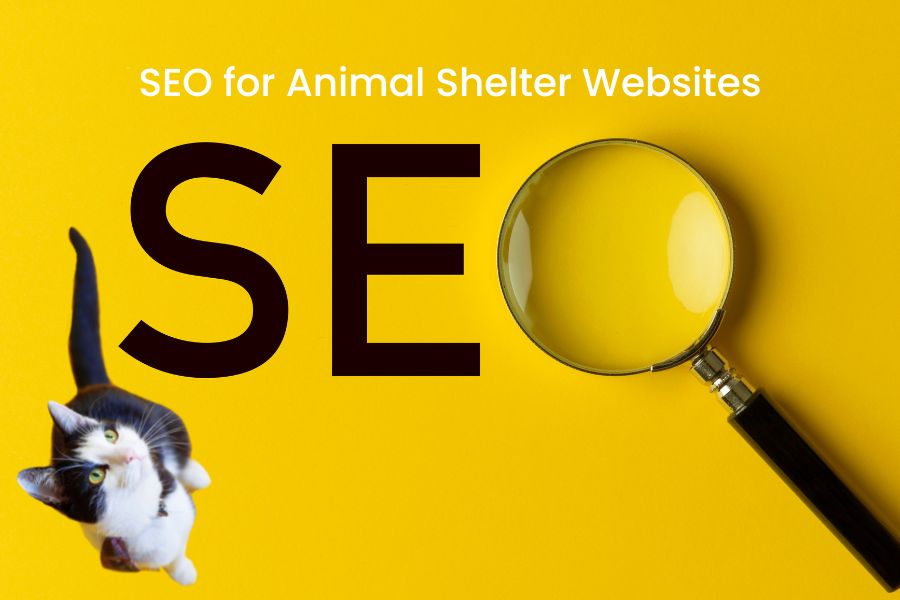Animal shelters play a crucial role in the lives of homeless animals. These organizations provide them with food, shelter, and medical care until they can find their forever homes. Shelters and rescue organizations reach a wider audience is through a great pet adoption website.
One way for a site to perform it’s best is by optimizing the site for search engines like Google and Bing.
Your Website Content
To optimize any website for search engines, it’s important to focus on creating high-quality, informative content. This content can include information on the specific services that a shelter offers, the animals available for adoption, and the impact the shelter has on the community.
Essential Pages for Animal Shelter Websites
Content is crucial to any website’s success, as this is the material that provides value to users and helps the site rank higher in search results. Here are some specific pages and content types that your animal shelter website should contain:
- About Us: Your about page should provide background information on your shelter, its mission, and the services it provides. Your shelter description should be well-written and engaging. Include details about the history of the shelter, the team behind it, and the impact that the organization has on the community.
- Adoptable Animals: A section dedicated to the animals available for adoption is a must-have for any animal shelter. This section should include high-quality images and videos of the animals, as well as information about their breed, age, and personalities. Providing detailed information about the animals helps potential adopters find their perfect match.
- Success Stories: Sharing success stories of animals that have found their forever homes is a powerful marketing tool. These stories showcase the positive impact your shelter is having on the lives of animals (and their new families). Positive stories also encourage others to adopt and support your cause.
- Services: Outline your organization’s the specific services. This can include information on veterinary services, adoption services, and volunteer opportunities. Summarize all your services on one page and break out the individual services to their own pages.
- News & Events: Keeping your website updated with news and events will keep visitors engaged and informed. This can include updates on new cat and dog arrivals, adoption events, other public events, and fundraising efforts.
- Volunteer: Provide information about the volunteer opportunities available at your shelter, as well as the process for becoming a volunteer.
- Donation Page: This is an important page! Your donation page should provide information about how to donate, as well as the different ways that donations can support your shelter’s mission. This should tie into an online donation processor to make contributions quick and easy.
- Contact Us: Include the shelter’s physical address, phone number, email address, location map, and contact form. A lot of this information should also be in your website’s header and footer.
By focusing on these specific content types, you can create a comprehensive, informative website that provides both value to users and improves your search engine ranking and traffic.
Writing Great Blog Posts and Content Updates
Creating a website that effectively communicates your animal shelter’s mission and services is crucial for attracting and retaining visitors. Regular blog posts can be a powerful tool for engaging with your audience and improving your search engine ranking. Here are some specific types of blog posts you should consider creating:
- Animal Care Tips: Share tips on how to care for different types of pets to engage with potential adopters and pet owners. Offer information on nutrition, exercise, and grooming, and position your animal shelter as a knowledgeable resource in the pet care industry.
- Adoption Stories: Highlight the positive impact your animal shelter has on the lives of animals by sharing stories of those who have been adopted. Encourage others to adopt and bring home a new furry friend!
- Volunteer Opportunities: Encourage community engagement by highlighting the various volunteer opportunities that are available at your shelter. Provide information on the various volunteer roles, requirements, and potential benefits.
- Fundraising Efforts: Keep supporters informed about your shelter’s needs by sharing updates on your fundraising efforts and events. Discuss how shelter donations are used, their impact, and ways for supporters to get involved in the process.
- Animal-related News: Engage with potential adopters and pet owners by sharing relevant news and articles on animal-related topics. Topics can cover animal health and welfare, pet behavior, and current events in the animal welfare community.
Use your blog to provide valuable information and engage with your audience. Regular blog updates can also keep your website fresh and relevant, attracting and retaining visitors.
Don’t Forget Your Location and Hours of Operation!
Your shelter’s physical address, phone number, email address, and hours of operation should be prominently displayed on the website’s home page and in your site’s footer. This information is important for users who are interested in visiting the shelter to meet and adopt animals or to drop off donations.
Also, provide a map or directions to the shelter on the contact page, as well as information about parking and public transportation options. This will help users easily find your shelter, especially if they are visiting for the first time.
Keyword Research
Keyword research is an essential part of SEO, as it helps identify the terms and phrases that people use to search for information related to your animal shelter or rescue. By incorporating these keywords into your website content and metadata, you can improve your search engine ranking and make it easier for potential adopters and supporters to find your site.
Below are some specific keywords and phrases you can target to improve your ranking:
- Shelter name: This is the easy one! Include your shelter’s name prominently on the site.
- Location: Mention your served location in the website content, title tags, meta descriptions, and website footer. This will help your shelter appear in search results when people look for animal shelters in your area.
- Adoption process: Detail your adoption process in your website content for people searching for information on adopting a cat or dog.
- Volunteer opportunities: Mention volunteer opportunities at your shelter, and what those jobs entail for people searching for volunteer opportunities in your area.
- Donations: Highlight the information about making donations in the website content, title tags, and meta descriptions. This will help it appear in search results for local donation opportunities.
By focusing on these keywords and phrases, you can make it easier for potential adopters, supporters, and volunteers to find your site. This will drive traffic to your site, increase engagement, and ultimately support your shelter’s mission.
On-Page Optimization
On-page optimization refers to the technical aspects of a website that can affect its search engine ranking for specific searches. This includes elements such as page title tags, meta descriptions, header tags, and overall URL structure.
On Page Technical Elements
The following are some specific ways you can optimize the various elements of the website:
- Title tags: Ensure that the title tag of each page accurately reflects its content and includes relevant keywords. Consider appending the page title with your organization’s name.
- Meta descriptions: The meta description is a brief summary of the page that appears in search engine results. Write and optimize meta descriptions to provide a clear and concise summary of each page.
- Header tags: Use header tags, such as H1 and H2, to structure the content of each page and make it easier for search engines to understand the page content. Make sure to structure the page headers logically and include relevant keywords in them.
- Image optimization: Images can make the content of the page more engaging, but they can also be optimized to improve the page’s search engine ranking, particularly for image search. Use descriptive file names, alt text, and compression to reduce the overall file size.
- URL structure: Optimize the URL structure of each page to be descriptive and include relevant keywords. For example: myanimalshelter.com/events/dog-meet-and-greet
- Internal linking: Internal linking refers to the links within a website that connect one page to another. Link text within the copy of pages helps search engines understand the relationships between the pages on the site.
By optimizing these elements, you can improve your animal shelter’s overall search engine ranking and help visitors easily find the information they are looking for on your website.
Mobile Optimization
It’s a mobile world, so it’s important that all websites are optimized for mobile devices. This means that your website should be responsive and able to adjust its layout based on the device being used to view it. Mobile-optimized websites load quicker on mobile devices and provide a better user experience. Also, fast-loading sites tend to rank higher in mobile search results.
Many content management systems, such as WordPress, have themes with built-in mobile design functionality that are automatically responsive for smaller screens and touch-based navigation. However, it’s important to test your website on various mobile devices to ensure that it looks and works properly.
There are several resources available for testing the mobile optimization of a website, including Google’s Search Console, BrowserStack, and Responsive Design Checker. These tools can help ensure that your site provides a positive user experience for mobile users.
Link Building
Link building is another important component of SEO, as it helps to increase the visibility and authority of a website in the eyes of search engines. To build links, reach out to other websites in your niche, such as animal rescue, and ask for a link back to your website. This is often done by suggesting a high-quality, shareable piece of content that the other site may want to link to.
The Best Links for Animal Shelters
Here are some specific types of sites that an animal shelter website should try to get links from:
- Local Businesses: Local businesses, such as pet stores and veterinary clinics, can be valuable link partners for animal shelters.
- Other Animal Shelters: Networking with other animal shelters is a great way to build links. By exchanging links with similar organizations, animal shelters can increase their visibility and reach a wider audience.
- Government Agencies: Animal shelters can also reach out to local government municipalities and agencies, such as the local animal control office, for potential backlinks. Government website links, in particular, provide credibility and authority.
- Non-Profit Organizations: Non-profit organizations that work to improve the lives of animals can be valuable link partners. By collaborating with these organizations, both organizations can reach a wider audience and improve their search engine rankings.
- Online Directories: Online directories, such as Google My Business and Yelp, can also be used to build links. By creating business profiles and claiming your listings, you can get backlinks from these directories and improve your online visibility.
- Social Media: Social media platforms, such as Facebook and Twitter, can also be used to build links. Creating a social media profile and regularly posting high-quality content and updates can drive traffic.
By strategically focusing on gaining links from these specific types of sites, you can build a strong link profile that will help your online presence.
To Wrap it Up…
Optimizing your animal shelter website will help it reach a wider audience and increase its online visibility. By focusing on high-quality content, on-page optimization, mobile optimization, and link building, you can improve your site’s search engine ranking and overall online marketing efforts.
Need help? Daley Professional Web Solutions provides animal shelter websites, SEO support and shelter software integration services.






0 Comments